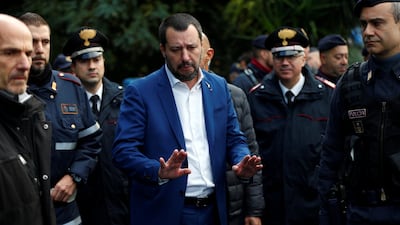Italian Deputy Premier Matteo Salvini signalled new openness to change the nation’s budget deficit target for next year, the focus of a standoff with Brussels over the populist government’s spending push to fund election promises.
Asked whether a 2.4 per cent target is set in stone, Mr Salvini told newswire AdnKronos: "I think nobody is fixated on this, if there is a budget which makes the country grow, it could be 2.2 per cent or 2.6 per cent."
“The problem is not about decimal points, it’s a question of seriousness and being concrete," Mr Salvini was cited as saying. The deputy premier said a pension reform to lower the retirement age, one of his key election campaign pledges, could come into force in February.
Armando Siri, an economic adviser to Mr Salvini, said in an interview with newspaper Il Messaggero that "a little fine-tuning of the budget" can be evaluated to avoid an increase in turbulence in the markets. He said only some measures are subject to possible change, and voters expect campaign promises to be kept.
Both Mr Salvini, leader of the anti-migration League, and fellow-deputy premier Luigi Di Maio of the anti-establishment Five Star Movement have so far stuck to deficit and growth targets in a clash with the European Commission, which may impose fines on the country amid concerns on Italy’s debt.
Mr Salvini and Mr Di Maio are due to meet Prime Minister Giuseppe Conte to discuss the budget, which aims to fund welfare benefits, tax cuts and the pension reform, on Monday evening. Mr Conte spent part of the weekend in Brussels seeking to sell the budget to commission head Jean-Claude Juncker and European leaders.
Messaggero said the meeting would be "decisive" as the leaders consider various adjustments.
But the European Union’s take-it-or-leave-it stand on Brexit at the Sunday summit does not bode well for Italy. The bloc left UK Prime Minister Theresa May with little room for political manoeuvring to sell the deal in the UK Parliament. Leaders insisted the Brexit agreement was the best available and non-negotiable.
If Mr Conte and his euro-sceptic deputies were hoping for concessions from the EU, the stance on Brexit must have left them disappointed. All Mr Conte won at a working dinner with Mr Juncker on Saturday was a pledge to continue talks over coming weeks as Italy seeks to avert, or delay, possible fines.
_______________
Read more:
Italy-EU standoff over budget rumbles on
Facebook to pay €100m to end Italian fiscal fraud dispute
_______________
Mr Conte was left acknowledging that the dinner “didn’t resolve matters” and voicing optimism that the dialogue ahead could stop the EU cracking down on Italy over the deficit target and concerns - shared by financial markets - of an impact on the country’s debt mountain, the eurozone’s biggest in real terms.
“There’s a good atmosphere, mutual trust,” Mr Conte told reporters after the summit. “We’re confident we can complete the process to our mutual satisfaction.” Asked if he would discuss lowering the 2.4 per cent target with Mr Salvini and Mr Di Maio, Mr Conte replied: “We always discuss the reforms and what is needed to carry out the promises we have made.”
On arrival at the Brexit summit, Mr Conte held up a thick dossier that he previously gave Mr Juncker, entitled A new path for a better future. Italy's new strategy for social and economic growth.
“This is what we talked about, I’m giving you a preview,” Mr Conte said. “We talked about these, in five months we are revolutionising the country and we will continue to do so.” His office said the report details past reforms and those due in coming weeks, focusing on a plan to boost investments.
What irks the commission and investors most however are the targets for the deficit and for 1.5 per cent economic growth next year. Mr Conte said budget targets were not discussed with Mr Juncker.
At the dinner Juncker said spending cuts of €6 billion (Dh25.02bn) to €7bn may be enough to trim the 2019 deficit, newspaper La Repubblica reported Sunday. Mr Juncker also called for Mr Salvini and Mr Di Maio to stop their verbal attacks on the EU, the paper said.
Mr Conte may offer to postpone to April the start of a "citizen's income" for the poor, a landmark Five Star pledge, and a reform to lower the retirement age, a League promise, in order to recover as much as €5bn that would be used for investments, newspaper Il Sole 24 Ore said.
Mr Juncker sounded an affectionate note. “We are not in a war with Italy,” he said on Sunday morning. Mr Juncker said he and Mr Conte had agreed to keep in “permanent contact” to help reduce the differences between the two sides.
The commission said this month that Italy wasn’t respecting EU rules on borrowing, which may lead to a so-called excessive deficit procedure. That could involve fines of 0.2 per cent of Italy’s gross domestic product, increasing to 0.5 per cent if Rome does not amend its budget.

